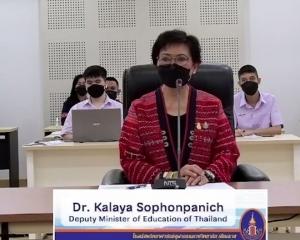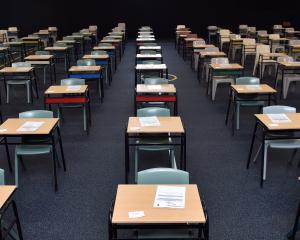
It was one of many paraded about the central city by about 500 secondary school teachers who marched from John Wickliffe Plaza to the Ministry of Education's Dunedin offices in Moray Pl, where they used a megaphone to deliver a message to Education Minister Anne Tolley.
The message expressed the PPTA's concerns about the lack of engagement in the negotiation of the secondary teachers' collective agreement, particularly around the areas of professional learning support for teachers, pupil and teacher learning areas, and good employment conditions.
"This lack of engagement has resulted in this industrial action," PPTA Otago secretary Chris Abercrombie said.
"Further, we are concerned that the Ministry of Education's pay offer is well below both the projected inflation level and the increases won by other industries."
Mr Abercrombie said New Zealand had the fourth-best education system in the OECD, but its teachers were some of the poorest paid and hardest worked in the OECD.
"We encourage you [Mrs Tolley] to have your negotiating team engage productively with the New Zealand PPTA at the negotiation table so we can obtain the best outcome for both teachers, the Ministry of Education, and more importantly, for students."
The group then marched to the central carriageway in the Octagon where speeches were made and songs were sung to the accompaniment of a band of itinerant music teachers.
Schools in Canterbury were exempted from yesterday's national strike action, because of of the 7.1 magnitude earthquake which devastated the region this month.
PPTA president Kate Gainsford called on boards of trustees across the country to donate teachers' wages saved from the strike day, to Canterbury's quake relief fund.
The one-day strike was the first in eight years for the PPTA, and affected nearly 13,000 pupils from 22 Otago secondary schools, and about 280,000 pupils from more than 450 secondary and intermediate schools across the country.
The PPTA is seeking a 4% pay rise for its members and has rejected the Ministry of Education's offer of 1.5% this year and a further 1% next year.
Negotiations have stalled, and the PPTA has threatened to run a series of rostering-home strikes during term four, in which pupils in certain year levels would be sent home for the day.
Ministry of Education workforce group manager Fiona McTavish said the ministry's offer was a good one, and in addition to salary increases, teachers were offered more sabbaticals, allowances, non-contact hours, and relief-teacher days.
She said the ministry's offer had to be seen in the context of the economic climate, other recent state-sector settlements, and recent generous salary increases for teachers.
"I encourage people to look at our actual offer.
"They'll see that statements made by PPTA members about non-contact hours, class size, or the number of days teachers are required to be available during term breaks, are simply incorrect.
"The Government values secondary teachers."
Bargaining was a two-way street, she said.
"The PPTA needs to prioritise its claims, be prepared to bargain constructively, call off its unnecessary and disruptive industrial action, and then come back to the table."











